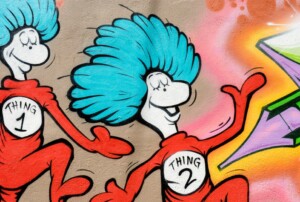
If you’re a living, breathing human being, you know how to tell a story.
That’s because our brains are built to run on stories the way your phone runs on Android or iOS.
Still, a lot of impact entrepreneurs feel out of their depth even just thinking about telling their stories.
And if you’ve ever searched for “storytelling” online, it’s not all that surprising. At the time of writing, Google spits out 137 million search results — many of which contradict one another.
Spend 30 minutes reading blogs online, and you’ll come across information such as this…
When you want to use storytelling in your copywriting you need to pick a genre you’re going to steal from. You want to center your work around a certain mood, a specific emotional response. Are you writing a horror story? A romantic comedy? Or something else?
… which seems to give completely different advice from this article by Jody Aberdeen:
What people are craving more than anything in 2019 is something, maybe someone, to root for, not rail against. Make sure to show your audiences, through your storytelling, the world that you want to create and invite them to create it with you.
Faced with the decision between picking a genre and painting a positive vision of the future, many social entrepreneurs simply give up.
If that’s you, I want to encourage you to enjoy the power of story. Check out our extensive Brand Story Guide and learn more about how you can use story to build your brand today.
Read on to find out about the benefits of storytelling — and how to overcome the overwhelm that’s holding you back.
Stories Help Us to Become Better Humans
Not only are stories a source of great joy, they also build deep connections, switch on our empathy and allow us to learn by impacting our brains and our hormones directly.
It’s that authentic connection that makes storytelling so important, “especially in times of widespread crisis of trust in advertising”.
Whether you’re writing blog posts or producing video ads, stories can work wonders for your business and your cause. They will engage people more than factual content, and your audience will think more highly of your work.
Here are 3 areas where you’ll benefit most from the power of stories:
1. Storytelling Will Make Your Blog More Engaging
Did you know that stories can keep your visitors reading for longer? Carolina Stubb from the Stockholm School of Economics found that
using a storytelling message format compared to an informational message format when a blogger reviews a sponsored product increases the blog readers’ viewing time of the sponsored blog post. This has important implications for advertising attention, since increased attention towards an advertisement can result in enhanced brand recall and purchase intentions.
2. Storytelling Will Make Your Facebook Ads More Profitable
Tara West found that 55% of people would consider buying from a new brand in the future if they really loved a story told via Facebook ads:
According to her research, the most effective way to advertise on Facebook is by “sequencing ads together in a way that tells a brand story”, rather than “a sustained message focused solely on driving an action”.
It’s worth playing with ads that break up the customer journey into smaller steps based on your story, rather than “going all in” with a single ad that asks the viewer to make a purchase straight away. This approach establishes you in the minds of your audience, and you’re more likely to ask for the sale at the right time in their relationship with you.
3. Storytelling on Your Packaging Will Make People Love Your Product More
Beata Zatwarnicka-Madura and Robert Nowacki summarised the research on the effectiveness of storytelling in advertising. They found that “even a short brand story included on FMCG [Fast-Moving Consumer Goods] packaging had a positive impact on consumers’ affective, attitudinal, product value, and behavioral intention responses to the brand.”
This means you can build stronger customer relationships, long-term loyalty and spontaneous advocacy just by printing your story on the box or wrapper! Plus, you’ll get away with charging a higher price — which is so important for any brand with a fair and sustainable supply chain.
Right, so we know that storytelling is the holy grail of marketing. But how do you get started if you’re feeling stuck?
What’s holding you back from telling your story?
In my work as a copy coach and trainer, I’ve found that most storytelling overwhelm comes from 3 mindsets holding us back:
-
The search for “the one” story
-
Reading too many business books
-
Worrying that storytelling for business is inherently unethical
In the final part of my article, I want to shed some light on each one to help you free yourself from those unhelpful mindsets.
1. Are You Searching For The One Story That Will Change Everything?
You may be searching in vain.
The thing is, all that content about “telling your story” — in the singular — suggests that there is this ONE magical story that you need to tell, and your business success is basically guaranteed.
Sounds great!
But then you sit down at your desk and you start to take notes, and you discover…
There’s no single story beckoning to be told.
Instead, you’re faced with a multitude of story snippets, glittering like fairy dust. All of them seem worth telling.
The best thing you can do is this:
Catch the one that appeals to you the most right now and start telling that story. Then move on to the next one.
You’re in this for the long haul. There’s always time to tell more stories later; the important thing is to get started.
2. Are You Reading Too Many Business Books?
In recent years, we’ve been inundated with “storytelling-for-business” books.
At first, this seemed like a genius idea — but as more and more books got published, many have gone too far in their search for an easily repeatable recipe.
As a result, many readers start out enthusiastically until they start working on their story and hit a prescriptive wall.
One of my favorite love-hate example of this is Donald Miller’s Building a Story Brand. The book is a huge commercial success and a huge commercial enterprise, with associated consulting, online platforms, events, and webinars attached.
However, it’s also one of the most misunderstood books of the last decade. Building a Story Brand is often recommended as a book about storytelling, creativity or even copywriting. Thing is, it’s none of the above. Really, it’s a book about branding, and that’s where it’s strongest. Donald Miller uses stories as metaphors that help businesses understand how branding works. When he ventures into storytelling or copywriting territory, he makes claims that are so absolute that they’re no longer true. (After all, one of the only rules of copywriting that all copywriters can agree on is “always be testing”.)
Storytelling is a courageous creative process. So, read books that help you build your confidence and your creativity muscle — for example, books by artists, novels, short stories, and autobiographies.
And if you decide to use a framework, remember it exists to serve you, not the other way around. Use it as a springboard for your imagination and to bring order to the chaos of too many ideas.
Are You Secretly Worried That Storytelling is a Sneaky Sales Technique?
There’s a myth that’s causing much trouble in the purpose-driven business world…
The belief that all stories must be used for marketing a product or service:
If you want to advance your social enterprise, you’ll need to transform the stories that mass numbers of people around the planet have about the causes and issues that matter to your business. You’ll need to inspire them on a deeply emotional level to do what’s right, which should also look like buying your products and services.
Why is this a problem?
Most people don’t like stories with ulterior motives. They feel dishonest and smell of snake oil. Listening to a story like that is almost like ‘sponsored content’ or clumsy product placement.
But what’s even worse, I’ve seen the pressure to sell via story lead to writing blocks in some of the most creative people I know.
And a strong focus on selling a product or service pushes the far more important offer in the background: the idea that’s being sold.
If you’re stuck telling your story, forget about your products and services and focus on the ideas and mindsets you want to foster in people. The best movies, novels and long-form news articles “sell” an idea to us: they create meaning and help us to make sense of the world. Just think of E.T. (friendship is also about letting go), The Lord of the Rings (a fellowship can overcome anything to fight evil) or even Pretty Woman (love crosses social boundaries and class is a function of looks and behaviour).
Whether you’re telling your founder’s story, your impact story or the story of your happiest customers: each is driven by a strong sense of purpose. Make your story about that, and your story has the power to change the world.
You might also enjoy:









